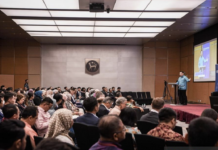PETALING JAYA, July 27 — When one speaks of Malaysians who are struggling to cope with the rising cost of living and the shrinking ringgit, the B40 group comes to mind.
But most families in the M40 group are also crying out for help. They have fallen through the cracks of government aid and are struggling to make ends meet.
Take Lim Yee Wai for example. With a monthly pension of RM2,500, many would think he is having an easy life, especially with no loan commitments and a wife who earns RM2,300 as an employee of a private nursing home.
He and his family can be considered among the lucky ones because their household income is above the RM4,000 low-income bracket.
However, with four children aged between nine and 15, Lim and his wife struggle to make ends meet despite their combined income.
“Despite having a monthly household income of RM4,800, we barely make ends meet each month,” Lim said, adding that the family is not able to enjoy many leisure activities.
“Although medical expenses are covered under my pension scheme, what we have is mostly spent on the children’s schooling needs and our daily expenses.”
The former surveyor at a government department said the family expenses include transport costs for his children, food, utilities, tuition and daily expenses.
“For groceries alone, we spend about RM1,000 monthly. Sometimes, we try to cut down but it does not make much of a difference because we will then have to buy takeaway food, which accumulates to more expenditure,” he said.
The Lims do not qualify for the government’s Bantuan Sara Hidup (BSH) financial aid because they are not within the low-income category.
To qualify for BSH, Lim and his wife must earn below RM4,000 between them. Even as a senior citizen, he still does not qualify because his total household income is RM4,800.
The BSH aid is given in cash to receivers who qualify according to a government-announced set of criteria.
Apart from aid in the form of cash, those who qualify for BSH are also entitled to the Skim Khairat Kematian (Death Benefits Scheme) and other benefits such as Back to School aid, public transport discounts, free medical aid and free insurance coverage.
Lim said his children also do not qualify for the Back to School aid that is aimed at alleviating the burden on parents or guardians, especially at the beginning of the year.
“The Back to School financial assistance is only given to Year 1 to Form 5 students from families with a gross household income of RM3,000 and below,” he said.
Meanwhile, 32-year-old Malik Husaini from Kuala Lumpur said he also “fell” through the cracks of government aid due to the minimum income cut-off.
The civil engineer at a private company earns RM5,500 while his wife Salina Ishak, 30, is a homemaker. The couple have five children, including two sets of twins aged seven and 18 months. Their other child is four years old.
“We used to be financially comfortable even after the birth of our third child. But then, the Covid-19 pandemic hit and we never expected to lose our jobs.”
Malik said his wife left her job in February 2020, before the movement control order was enforced.
“During the pandemic, we spent a lot of time at home and saved some money. However, when we found we were expecting our second set of twins, we started to panic,” he added.
Malik said his wife immediately started to look for a new job after the twins were born but has yet to hear from potential employers.



















